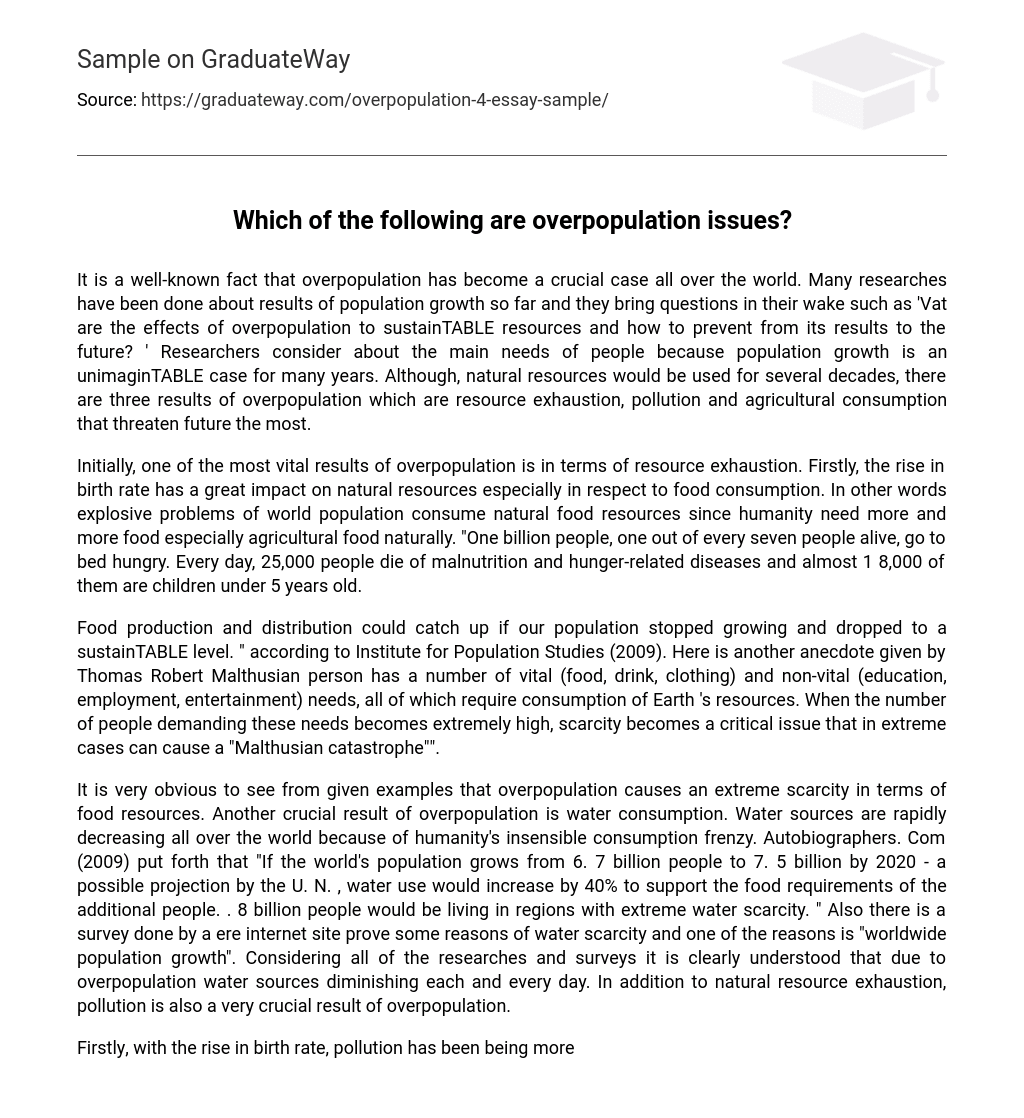Global recognition of overpopulation as a pressing issue has led to extensive studies assessing the consequences of population growth. These studies have raised concerns about the sustainable use of resources and the necessity for preventive measures. Researchers are committed to addressing individuals’ basic needs while acknowledging that population growth remains an ongoing problem. Although some natural resources may still be accessible for a few more decades, the most alarming effects of overpopulation encompass resource depletion, pollution, and heightened agricultural consumption.
Overpopulation has led to the depletion of natural resources, particularly in terms of food consumption. The high birth rate has a significant impact on available resources, resulting in a greater demand for food and agricultural products. Consequently, natural food resources are being rapidly depleted. Sadly, approximately one billion people (about one out of every seven individuals) suffer from hunger daily. This tragic situation leads to the death of 25,000 individuals each day due to malnutrition and hunger-related illnesses, including nearly 18,000 children under five years old.
The Institute for Population Studies (2009) proposes that if the population were to cease growing and attain a sustainable level, there exists the potential for food production and distribution to catch up. Thomas Robert Malthus also emphasizes the significance of meeting both essential needs (such as food, drink, clothing) and non-essential needs (like education, employment, entertainment), all of which depend on Earth’s resources. However, when the number of individuals seeking these necessities becomes excessive, scarcity becomes a notable problem that could result in a “Malthusian catastrophe”.
Overpopulation has clear consequences, including a severe lack of food resources and water consumption. Numerous examples demonstrate the impact of overpopulation on food scarcity. In addition, water sources are rapidly diminishing worldwide due to humanity’s careless consumption habits. According to Autobiographers.com (2009), if the global population increases from 6.7 billion to 7.5 billion by 2020 (as projected by the U.N.), there would be a 40% increase in water usage to meet the additional people’s food needs. This would result in 1.8 billion individuals residing in areas with severe water scarcity. Supporting this fact, a survey conducted on an online platform confirms that population growth contributes to water scarcity. Various studies and surveys provide unequivocal evidence that overpopulation is causing a decline in available water sources day by day.
Furthermore, pollution is another significant outcome of overpopulation and exacerbates natural resource depletion.
The rise in pollution due to the increase in birth rate has greatly impacted the environment and biodiversity. The Nun’s 3rd Global Biodiversity Outlook states that factors such as over-population and the presence of five seasons have impeded efforts to reduce biodiversity loss. Additionally, a report by the Environment New Service confirms that extensive destruction of vegetation is leading to the decline in biodiversity. Hence, it is clear that human activity, particularly over-population, plays a direct role in decreasing biodiversity.
Furthermore, the extinction of certain species is being caused by pollution. Pollution is having a growing impact on fish populations in seas and oceans globally. Experts warn that pollution will exhaust springs, rivers, wetlands, and underground water sources, as well as cause lasting harm to lakes and estuaries where fish breed. The consequences of pollution on aquatic ecosystems are substantial. Additionally, recent research suggests a nearly 50% decrease in fish diversity over the last ten years with no signs of this trend easing.
According to studies and observations, if pollution continues at its current rate, fish diversity will be nonexistent by 2050. This shows that pollution is an inevitable result of overpopulation.
In addition, overpopulation directly leads to resource depletion, pollution, and the consumption of agricultural products. The increase in population has caused farmers to cultivate dry, hilly, and infertile areas unsuitable for farming as fertile lands in heavily populated regions expand. Reliable estimates indicate that approximately 1 billion hectares of land have seen a significant decline in agricultural productivity over the past 50 years – equivalent to Europe, the United States, and Mexico combined.
Furthermore, analysts have observed a decrease in agricultural fertility and a diminishing variety of agricultural goods due to the decline in fertile lands caused by population growth. This continuous pressure on natural flora and fauna forces them to adapt rapidly to changing environments, resulting in the extinction of about 10% of species reported by Pressure (1992).
Increase in population will result in reduced agricultural diversity and arable lands. Overpopulation poses major risks, such as resource depletion, population growth, and increased demand for agriculture. Numerous studies aim to tackle and prevent these consequences. However, the difficulty lies in educating people about family planning, particularly among the illiterate or uninformed about demographic factors.
It is essential to inform individuals about the repercussions of overpopulation since it can result in a scarcity of food and habitable regions if population expansion continues at its present rate.





